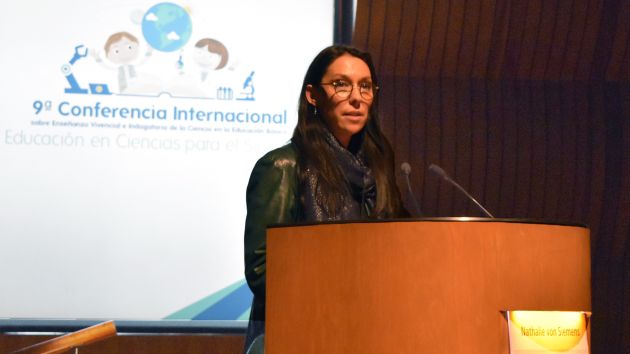From December 4–5, the foundation Siemens Stiftung participated at INNOVEC (Innovation in Science Education, Innovación en la Enseñanza de la Ciencia A. C.) 9th International Conference on Inquiry-Based Science Education (IBSE at El Colegio Nacional, Mexico City). The event was organized by INNOVEC and the United States-Mexico Foundation for Science (Fumec) with the support of Mexico’s National Ministry of Education (SEP) and the National Science and Technology Council.
Over 300 academic advisers, teachers, decision makers and education experts from Mexico and abroad discussed the contributions that inquiry-based science education can make for the formation of a global citizenship, the development of scientific competences, economic development and environmental sustainability in the 21st century.
In a keynote speech, Nathalie von Siemens addressed the relevance of STEM education for the further development of society in the 21st century: “With a growing global population and finite resources, we need to teach children why it is important to live sustainably – not just how to do it. This is why Education for Sustainable Development (ESD) also plays an important role, and not just for environmental issues – it is important to integrate economic, social, and cultural development, too.”
The conference is held every two years, during which INNOVEC’s board honors two people who have made significant contributions to science education. Nathalie von Siemens, Managing Director of Siemens Stiftung, was honored for her relentless commitment to improving scientific education at the international level through Siemens Stiftung’s international educational program Experimento. The program – which focuses on inquiry-based learning, on training teachers and on providing an array of free online instruction materials – connects STEM to real life and teaches children how to think like scientists.
Nathalie von Siemens also addressed the unique roles that foundations can assume to promote and develop scientific competences among students: “Foundations do not replace talented teachers, passionate politicians or resourceful entrepreneurs. But a foundation has the freedom and thereby the duty to experiment with new approaches. Foundations are neutral and credible, free of lobbying on behalf of one company or industry and work instead for the good of society as a whole. Foundations can build bridges – bridges from one sector to the other, but also bridges to the fringes of society.”
Siemens Stiftung is honored to receive this distinguished recognition and expresses deep respect and gratitude to INNOVEC and all cooperation partners and teachers who have contributed to making Experimento a success. Siemens Stiftung is committed to continuing its efforts aimed at benefitting Mexican students and increasing their ability to create a sustainable future for themselves and their society.



